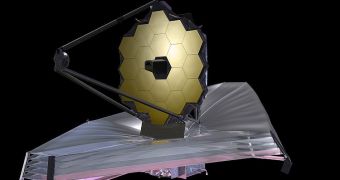The provisions of a spending bill for 2012 call for the James Webb Space Telescope (JWST) project to be discontinued. The document was put together by members of the House Appropriations commerce, justice, science subcommittee.
This group oversees all NASA spending. Its members say that the proposal is part of larger cost-cut scheme, which would take more than $1.6 billion out of the American space agency's funding.
For all intents and purposes, spending levels at the agency would revert to pre-2008 levels. This means that the US civil space program – already affected by the cancellation of Project Constellation and end of the Space Shuttle Program – will deal with an even more massive blow.
The announcement was made on Wednesday, July 6, and showed that the subcommittee only wants to fund NASA with $16.8 billion in 2012. This level is about $2 billion below what US President Barack Obama proposed in his 2012 budget request.
Today, July 7, panel members will vote on the draft appropriations bill, which also calls for $1.95 billion to be allotted for the development of the Space Launch System, NASA's next heavy-lift rocket.
These sums are higher than what the SLS got for 2011 by about $150 million, but more than $700 million short of what Congress called for in the NASA Authorization Act of 2010. The latter became law back in October, Space reports.
One of the provisions is especially detrimental to US space exploration – the cancellation of the JWST. The telescope – a project worth $6.5 billion – is destined to become the next flagship observatory, capable of replacing the Hubble while peering back through time to the beginning of the Universe.
The JWST would cost $1.5 billion over the initial budget projections, and would be completed in September 2015, rather than September 2014. There are numerous reasons for the delay, an independent panel learned during an investigation conducted in November 2010.
Still, analysts say, the impressive machine is well underway as far as design, development and construction go. All of its highly-advanced mirrors are polished, its frames and sunshield are built, and some of the components have already been integrated.
Cost overruns are inevitable when a space agency is building the largest, most complex telescope in the world, that dwarfs the Hubble, and provides a way of peering back into a time when the entire Universe was only a fraction of its current age.
It remains to be seen whether the subcommittee members will realize the importance of the JWST in time to save it. Already, billions of dollars have been invested in it, and it would be a shame to throw all this money down the drain.
On the other hand, Project Constellation was canceled after NASA invested $9 billion and 5 years of hard work, so anything is possible.

 14 DAY TRIAL //
14 DAY TRIAL //